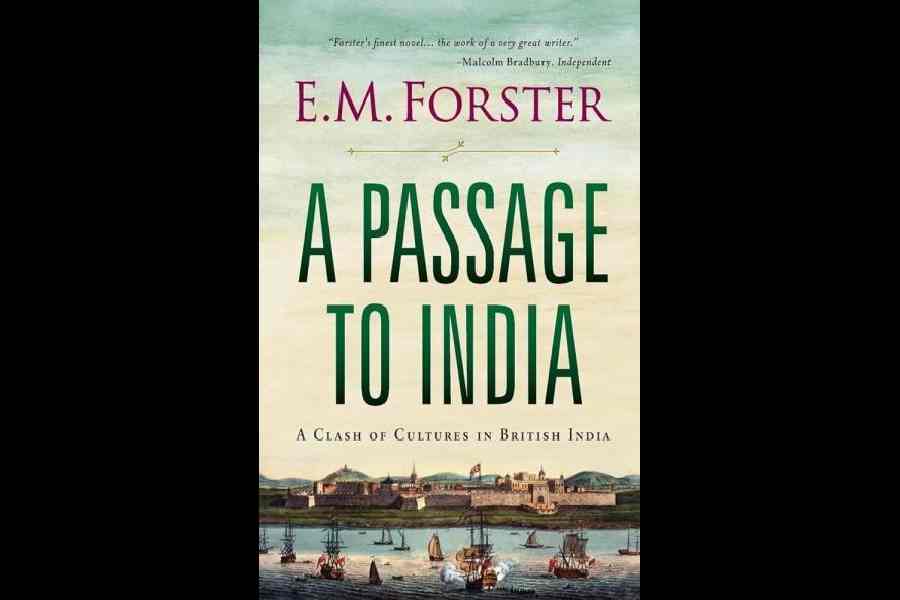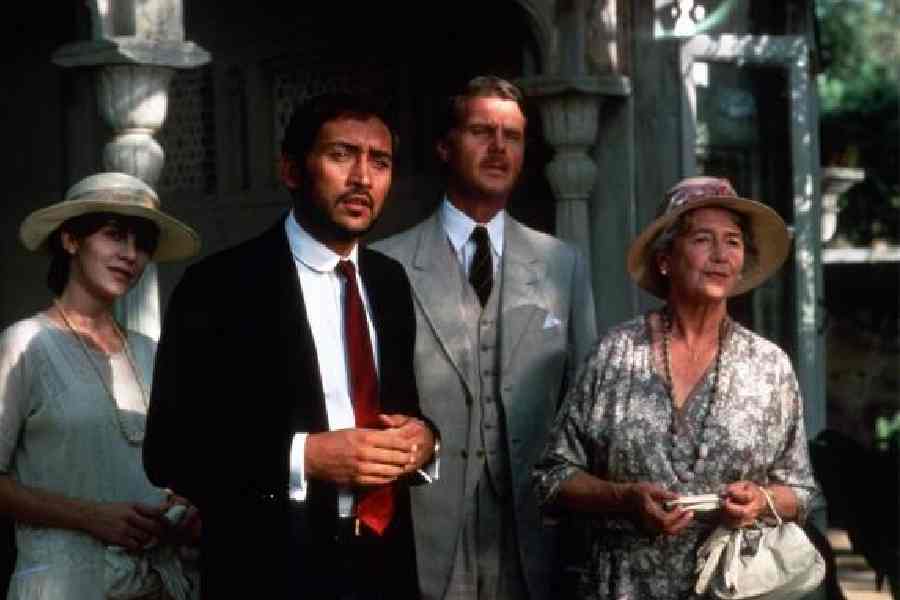How should we remember A Passage to India that E.M. Forster wrote in 1924, a hundred years later? We surely cannot think of the author and his novel in the same way as our parents thought of them when the book was published and at the moment of Indian Independence.
In the rich literary flurry of British writers who were exceptionally sensitive, sympathetic, and talented and writing about the Raj, particularly between 1900 and 1940, four names catapulted themselves to the top of the list — Rudyard Kipling, the author of Kim (1901), Leonard Woolf (Village in the Jungle, 1913), George Orwell (Burmese Days, 1934) and E.M. Forster (A Passage to India). These four men wrote fearlessly, with compassion and an unusual level of objectivity as they culled their creative gems from a fraught and bubbling cauldron of history. The early 1900s were some of the worst years of British imperialist rule in the subcontinent when racism and segregation were de rigueur in the delivery of a lopsided kind of justice to Indians.
First, we should remember that Forster’s Passage is somewhat similar to Orwell’s Burmese Days as both novels are critical of British hegemonic practices and the unequal imperialist relationship between the English ruler and the Indian subject. In both novels, the club serves as a privileged space that excludes native Indians and Burmese from membership. Burmese Days ran into a storm of criticism back home in England for having let the side down badly by portraying the British as domineering, hegemonic, and racist. Passage was spared the scathing criticism back home, but still the interracial friendship between Mr Fielding and Dr Aziz had critics expressing concern.
Second, these novels are remarkable, even extraordinary, because they were written prior to the Indian independence movement gathering force, which makes them sympathetic to the Indian cause, but they stop short of advocating Independence. They seem to want the white characters to somehow become less imperialist, less hegemonic, and less dominating.
It was a pipe dream, of course. Ramsay MacDonald had become the first Labour Party prime minister in 1924, the 407-year-old caliphate of the Ottoman Empire was abolished in that year, and the British Empire Exhibition opened in London, the largest colonial exhibition with 58 countries of the empire dramatically represented.
Third, after 100 years, what do we think of the characters of Dr Aziz, Principal Fielding, the British Magistrate of Chandrapore Ronny Heaslop, and the two women Adela Quested and Mrs Moore?
Dr Aziz is certainly not a second-rate medical practitioner (as the novel’s English characters hint at), but is fully qualified, no less than a British colleague, as Forster himself showed. Witty, charming, talkative and wanting desperately to be liked, Dr Aziz endears himself to intelligent and broadminded women across ages, whether an elderly Mrs Moore or a young Adela. He is able to discuss philosophy and architecture when he meets Mrs Moore at the mosque. But Dr Aziz’s garrulousness suggests his secret desire to be articulate like the white masters, to become like them — even better — and to perform mimicry.
After a hundred years, the character Fielding, the principal of a college for Indians in Chandrapore, still comes across as sympathetic, inclusive, more welcoming of Dr Aziz in his own home than his own countrymen who saw Indians as inferior. Early critics’ concerns soon after the book’s publication were that the relationship between Fielding and Aziz had crossed race lines and did not bode well for keeping the races segregated. Forster’s depiction of the two men as close friends struck back at the segregationist policy and the false sense of British superiority.
The magistrate at Chandrapore, Ronny Heaslop, must remain carved in stone, just the way Forster had sculpted him, as uncouth, misogynistic and domineering, typical of British bureaucrats of the time. The character of Heaslop was crafted from the personal, first-hand, lived experience of Forster with such bureaucrats of the period.

A Passage to India
Forster does the historically correct thing by showing Miss Adela Quested as a woman who has come on a ship to India looking for an English husband. It was a time when horizons were stretching. Anne de Courcy says in her book The Fishing Fleet that “barely mapped parts of the globe were being added to the British Empire, almost daily”. The British were entrenched in their rule and rape of India and this was possible by the influx of thousands of British army personnel to India. And in the natural order of human life, these young men needed to marry. So, many thousands of young British women were put on British ships by their hopeful families, or they bought a passage themselves and came husband-hunting or fishing for a husband to India as part of what we know as “the fishing fleet”.
The most mysterious young woman in Passage — Adela Quested — is one such husband seeker, brought to India to meet her marriage prospect Ronny Heaslop, the unbearably overbearing district magistrate of Chandrapore, by his mother, the sagacious, calm old lady, Mrs Moore. Adela is appalled by her husband-to-be Heaslop’s atrociously rude and terrorising behaviour towards his own educated and polite Indian associates, even to Dr Aziz, the doctor whom she likes almost immediately after she meets him.
The immediate connect between Adela and Dr Aziz is the fulcrum of the plot of Passage. At great cost to himself, Dr Aziz invites Adela and Mrs Moore to a picnic in the Marabar Caves, a location where the “event” that causes the blow-out between the British rulers and the colonial subjects occurs. When Adela enters the cave, was she accompanied by a guide and Dr Aziz? The reader is unsure, and Dr Aziz does not seem to know.
The reader sees just Adela sprinting down the hillside, leaving the scene in a very distraught frame of mind.
When the rest of the party returns to Chandrapore, the reader is in shock as are Aziz and Fielding — and Adela has filed a report about being attacked and the alleged perpetrator she says is Aziz. The polarity between the British and the Indians is at its sharpest and there is a mammoth question hanging like the echo in the cave — ‘Did Aziz rape Adela in the Marabar caves?’ Somewhere, this ambiguous, overarching question drives the narrative and expressly leaves the writer, the reader and the story in a muddle, to quote Mrs Moore, who is a nurturing, pragmatic and unprejudiced mother figure.
The character Mr McBryde, the district superintendent of police of Chandrapore, together with Heaslop and their friends in the club, bring false charges of assault against Dr Aziz, turning the British sense of fair play on its head. The English women in the novel such as Mrs Callendar and Mrs Turton are like a pack of hungry wolves hunting down what they think will be easy prey in Dr Aziz, and they exert pressure on Adela to bring rape charges against her own sense of what happened. In the end, Dr Aziz is acquitted of the false allegations.
The central character, Miss Adela Quested, who first brings the charges against Dr Aziz and then drops them under a haze of her personal confusion and forgetfulness, is in today’s woke world a woman without agency. In Passage, she was under the guardianship of her husband-to-be, and a daughter of the Empire that needed to be protected.
Many of the best writers suffer from writer’s block for some amount of time and that is a part of being a creative artist. However, Forster was in arrested development for nine years and arguably one of the most honest yet innovative novels about the Raj written by an Englishman — Passage — took him 11 years to finish. By his own admission to his closest friends, Forster has said that he was unsure of finding a satisfactory explanation for his block. Several readers and literary critics have wondered about the lapse. In some way this conundrum about Dr Aziz being responsible or not threw Forster a mighty challenge that tied him in knots for several years.
Forster was a very private man and though he kept diaries and journals, he rarely bared details about intimacy and relationships. And the revelations about his sexual secrets were oblique and minimalistic. When he began to write Passage, Forster was already a well-published novelist who, in a frenzy of creative energy, was all done between 1905 and 1910. At this point he was toying with the idea of writing Arctic Summer but he did not write it.
Another kind of pull worked on him at this time that led him to plan his first trip to India.
His motive for coming was to see Syed Ross Masood, a young Indian man whom he had taught Latin in preparation for Masood’s Oxford degree in England in 1906. The idea of an Indian novel was planted in his mind by his friendship and exchanges with Masood. When Masood completed his legal studies and returned to India, Forster followed a few months later. By then, he had started obsessing about India. Masood charmed him into writing an Indian novel. “But for him,” Forster admitted years later, “I might never have gone to his country, or written about it… I didn’t go there to govern it or to make money or to improve people. I went there to see a friend.”
Forster was in India for six months, from October 1912 to April 1913. He travelled a good bit and met many people. It is easy to pick up, in his letters and diaries, how stirred he was by his experiences. And unsurprisingly, a great deal of what he saw and heard went straight into his book. The Barabar caves, which became the Marabar caves in Forster’s Passage, are close to Bankipore, where Masood was living at that time. Forster was there for two weeks in the middle of his Indian travels, and he visited the caves on the day that he left.
He began writing Passage in July 1913 soon after returning to London from India, but just two months later, in September, he dropped it in favour of Maurice, his risque homosexual novel. On a second, year-long visit to India in 1921, this time as the private secretary to the Maharaja of Dewas, he brought along the unfinished chapters of what would later become Passage, in the hope that the environment would inspire him but it did not. He was eventually able to finish the book after his return to England. His experience in Dewas led him to write a non-fiction book, The Hill of the Devi, in 1953, set in that kingdom, centring on the lives of Indian kings and their internal feuds.
The maharaja, interestingly, promoted him to the rank of a minor noble, and later gave him the state’s highest honour, the Tukoji Rao III Gold Medal. The short episode in Forster’s life became the basis for Passage. Who would have thought that the boy who schooled at Tonbridge School and studied history at King’s College, Cambridge, would end up as an Indian nobleman?
Much had been resolved at last, and on his return to England, Forster sat down to his book again. He finished it on January 21, 1924. It was dedicated “To Syed Ross Masood and to the 17 years of our friendship”. This was the last novel Forster wrote.
Julie Banerjee Mehta is the author of Dance of Life, and co-author of the bestselling biography Strongman: The Extraordinary Life of Hun Sen. She has a PhD in English and South Asian Studies from the University of Toronto, where she taught World Literature and Postcolonial Literature for many years. She currently lives in Calcutta and teaches Master’s English at Loreto College











